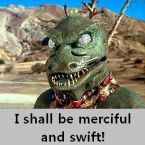Hotschi
Posts: 548
Joined: 1/18/2010
From: Austria
Status: offline

|
quote:
ORIGINAL: mind_messing
quote:
ORIGINAL: Hotschi
Whether the bombs were "necessary " or not, is a purely academic question. They were dropped, period.
Call me a cynic, but what's the difference between wiping out a city with a single nuclear bomb (read further please) or doing the same with thousands of explosives or incendiaries? In both cases, people are crushed, suffocated, or burnt to death.
For the people involved on the U.S. side, using a nuke was just another way to destroy a city and thus force the enemy to surrender - the long-term effects of radiation were not known at that time. (source Richard B. Frank)
Regarding the Emperor of Japan, at that time a "god-like" creature, he couldn't care less about his "subjects" (more properly called "population") as he was more concerned in keeping the kokutai, i.e. his own status as Emperor (source Herbert B. Bix). The bombs finally gave that man a "face-saving" reason to end the war, and in a way to hypocritically "act in a benevolent way" to end the dying, as he is or - ever was - the "good guy". If Hirohito had actually cared for the Japanese, his fellow countrymen, he should have surrendered way sooner than he did. Even better, he should not have started a war which was impossible to win.
Invading the Japanese home islands, or blockading infinitely, would have cost way more lives on both sides than using the two only nuclear bombs which were available at that time. This may be cynic, yes, but you don't win a war by being "nice". And after all, the Japanese Emperor started the whole damn thing.
You seem to overestimate the power that came with the Emperor's position.
The Emperor was traditionally apolitical and served to rubber-stamp the decisions of his government.
Hirohito merely allowed himself to be swept along with the tide of war in order to preserve his position.
Yes, Hirohito could have opposed the war, and did all in his power to end it, but he would have ended up like his father - kept isolated from the circles of power and unable to cause the government any embarassment.
No I don't overestimate Hirohito's power or position. I recommend Herbert P. Bix, Hirohito and the Making of Modern Japan on this subject. Hirohito actually made the decisions, unlike his father - who was kept from public view because of his mental state, btw. He was ill throughout his life.
_____________________________
"A big butcher's bill is not necessarily evidence of good tactics"
- Wavell's reply to Churchill, after the latter complained about faint-heartedness, as he discovered that British casualties in the evacuation from Somaliland had been only 260 men.
|
 Printable Version
Printable Version




















 New Messages
New Messages No New Messages
No New Messages Hot Topic w/ New Messages
Hot Topic w/ New Messages Hot Topic w/o New Messages
Hot Topic w/o New Messages Locked w/ New Messages
Locked w/ New Messages Locked w/o New Messages
Locked w/o New Messages Post New Thread
Post New Thread